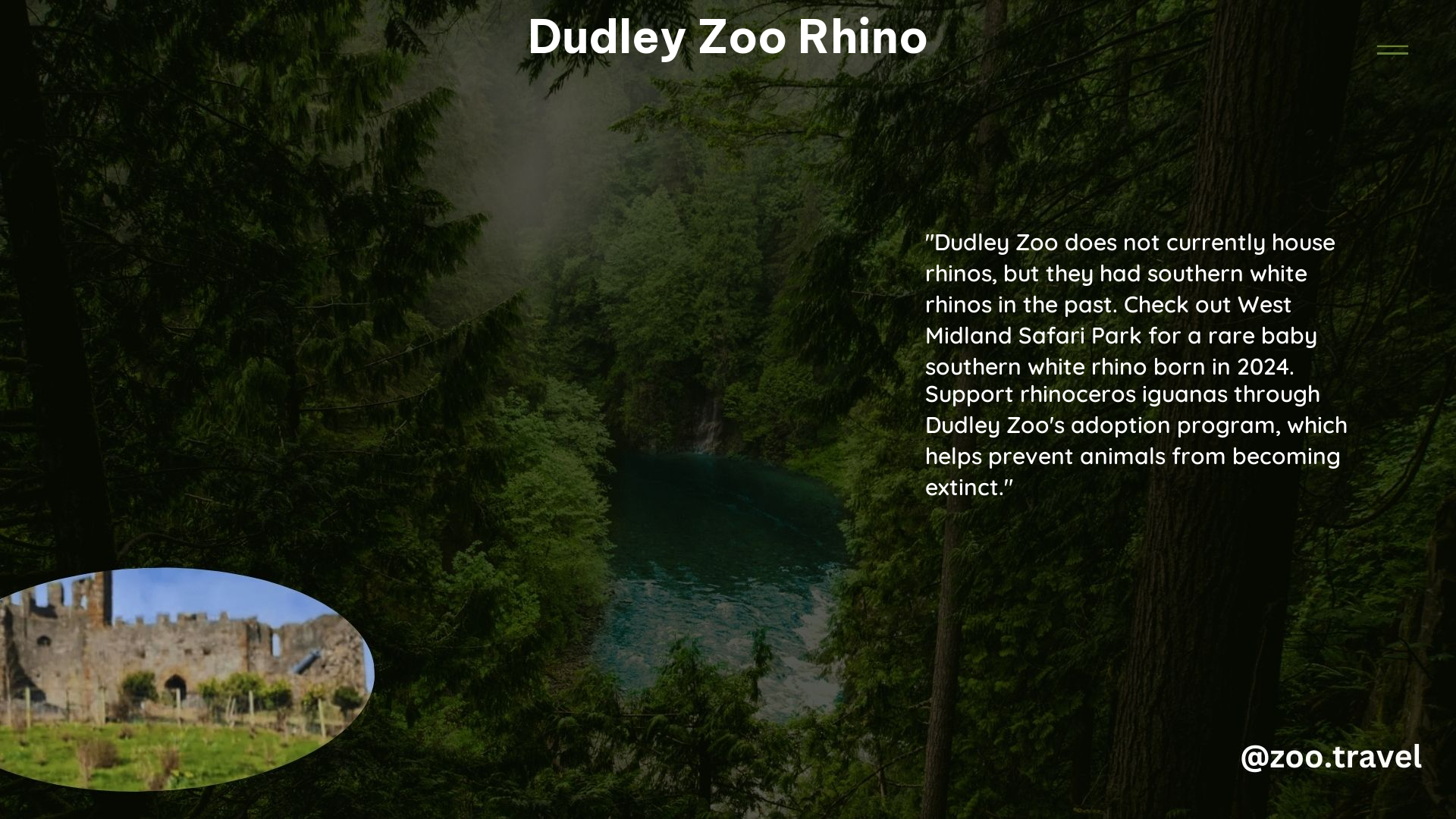Dudley Zoo, a renowned zoological attraction in the heart of the West Midlands, is known for its diverse collection of animals and its rich history. However, one animal that is notably absent from the zoo’s current lineup is the rhino. In this blog post, we’ll delve into the reasons behind the lack of rhinos at Dudley Zoo and explore the zoo’s fascinating history and its commitment to conservation.
The Absence of Rhinos at Dudley Zoo
Contrary to popular belief, Dudley Zoo does not currently house any rhinos. This absence is due to a variety of factors, including the zoo’s focus on other species, the challenges of maintaining a rhino exhibit, and the evolving priorities of the Dudley and West Midlands Zoological Society, the charity that operates the zoo.
Dudley Zoo’s Animal Collection: Past and Present

While Dudley Zoo may not have rhinos, it has a rich history of housing a diverse array of animal species. In the past, the zoo was home to a variety of animals, including polar bears, Southern elephant seals, an orca named Cuddles, and both African and Indian elephants. The zoo even offered elephant rides as a popular attraction from its opening in 1937 until the last two African elephants were relocated to Planete Sauvage in south-west France in 2003.
Today, Dudley Zoo is known for its collection of modernist animal enclosures and other buildings designed by the renowned architect Berthold Lubetkin and the Tecton Group. The zoo’s current animal residents include a variety of species, such as:
| Animal | Exhibit |
|---|---|
| Gorillas | Gorilla Colony |
| Penguins | Penguin Pool |
| Meerkats | Meerkat Mayhem |
| Reptiles | Reptile House |
| Birds | Bird Gardens |
Despite the absence of rhinos, Dudley Zoo continues to be a popular destination for visitors, offering a unique and engaging experience for animal enthusiasts and families alike.
The Dudley and West Midlands Zoological Society: Commitment to Conservation
The Dudley and West Midlands Zoological Society, the charity that operates Dudley Zoo, is dedicated to the conservation of wildlife and the promotion of environmental education. While the zoo may not currently house rhinos, the society’s focus has shifted towards supporting conservation efforts for other endangered species and promoting sustainable practices within the zoo.
One example of the society’s conservation efforts is its support for the Rhino Conservation Botswana project. Although Dudley Zoo does not have rhinos, the society recognizes the importance of protecting these iconic animals and has contributed to the efforts to safeguard rhino populations in their natural habitats.
Berthold Lubetkin and the Tecton Group: Architectural Masterpieces at Dudley Zoo
Dudley Zoo is renowned for its modernist animal enclosures and other buildings, which were designed by the renowned architect Berthold Lubetkin and the Tecton Group. These architectural masterpieces are a testament to the zoo’s commitment to providing a unique and engaging experience for visitors.
The Tecton Group’s designs at Dudley Zoo are considered some of the finest examples of modernist architecture in the UK. The group’s use of reinforced concrete and innovative design techniques created enclosures that were both functional and aesthetically pleasing, setting the zoo apart from many of its contemporaries.
One of the most iconic structures at Dudley Zoo is the Tecton Group’s Gorilla Colony, which features a striking circular design and a central moat that separates the gorillas from the visitors. Other notable Tecton Group designs at the zoo include the Penguin Pool, the Bear Ravine, and the Reptile House, all of which showcase the group’s commitment to creating innovative and visually stunning animal habitats.
Dudley Zoo’s Unique Attractions: Beyond the Animals
While Dudley Zoo may not have rhinos, it offers a variety of unique attractions and experiences for visitors. One of the most popular features is the zoo’s miniature railway, which allows visitors to explore the grounds from a different perspective. The zoo also boasts a chair lift, which provides a bird’s-eye view of the animal enclosures and the surrounding landscape.
In addition to these transportation-themed attractions, Dudley Zoo is home to a variety of educational and interactive exhibits, including the Discovery Trail, which encourages visitors to engage with the natural world and learn about the importance of conservation.
Conclusion
While Dudley Zoo may not be home to rhinos, it remains a fascinating and engaging destination for animal enthusiasts and families alike. The zoo’s rich history, its commitment to conservation, and its architectural masterpieces make it a unique and valuable asset to the West Midlands region. As the Dudley and West Midlands Zoological Society continues to evolve and adapt to the changing needs of the zoo industry, it will be interesting to see what the future holds for Dudley Zoo and its diverse collection of animal residents.
